Films of Resistance and Defiance Take the Screen at This Year's Seattle Asian American Film Festival
As immigrant communities across the country are under increased threats of ICE raids and deportations, there has been a strong show of resistance and defiance through protesting and legal action. Against this backdrop, the films screened at the Seattle Asian American Film Festival (SAAFF) encapsulate the dangers, hopes, and realities of the Asian American community.
The 13th annual SAAFF is taking place this weekend, June 20–21, at both the Wing Luke Museum and Broadway Performance Hall, screening movies by and about Asian Americans, Native Hawaiians, and Pacific Islanders. Across 28 shorts, features, and documentaries made by both local and national filmmakers are complex narratives about home, displacement, memory, and culture that reflect the diversity of the Asian American experience. And according to SAAFF Program Director Adrian Alarilla, current events have shaped this edition's screening selection.
"A common thread among many, if not all, of the films that we have this year is that we all seem to be processing our collective traumas as of late. With everything going on in the world and in the zeitgeist, it shows up in many of the films this year," Alarilla said in a recent interview.
"Many of our films this year are macabre, with dark themes — they're a bit grim. But at the same time, they're also defiant," he continued. "As we go through this dark place in our history, it's become even more important to share our stories and rise up and continue to be resilient and resist."
The festival's opening night selection — Reflections & Legacies — at the Wing Luke honors 50 years since the end of the Vietnam War and its impact on Southeast Asian refugees with a trio of documentaries: Saigon to Seattle (directed by Friends of Little Saigon and June Films) is a short that compiles oral histories of Vietnamese families in King County and Little Saigon; Home-land: Hmong American Women (directed by Pader Xiong) explores identity in Hmong American women; and feature-length Taking Root: Southeast Asian Resettlement Stories in Philadelphia (directed by Oanh-Nhi Nguyen) zooms into the Southeast Asian community in Philadelphia and U.S. military violence in their homelands that displaced them there.
"We thought it might be interesting to show because we have our own Vietnamese community here, so what are the parallels, what are the shared experiences that we have with the community in Philadelphia?" said Alarilla. "Why do these refugee stories continue to be so relevant and so powerful, especially nowadays in an age of increased border surveillance and attack on immigration?"
Viewers will have a chance to discuss the films and interact with one another at a post-film opening night reception at the Wing Luke, where DJ Magic Sean will be spinning records and Seattle lion dance troupe Mak Fai will perform a lion and dragon dance.
The rest of SAAFF's programming is on Saturday, June 21, at the Broadway Performance Hall. One of its centerpiece showcases is called Family Spirit, which explores "the scars that relationships leave behind when they go away, and the enduring connections of family and kinship." Narrative short Ah-Ma Burns (directed by Max Kane) follows a sick Chinese grandmother who goes on a journey to reconnect with her late husband. And feature film Bitterroot (directed by Vera Brunner-Sung) is centered around a Hmong man in rural Montana who is spinning out from a failed marriage, caring for his ailing mother, and now must tend to her root vegetable garden. Originally premiering at the Tribeca Film Festival, the movie explores the man's journey to find hope as the world burns around him.
Other highlights include a free Native Hawaiian film showcase; a feature-length documentary about legendary Asian American artist-activist Nobuko Miyamoto called Nobuko Miyamoto: A Song in Movement (directed by John Haas); and SAAFF's beloved Queer AF Shorts, a collection of films about queer and trans Asian Americans as they navigate identity and community, like in Ravenna Tran's Divine Intervention, in which an earthbound angel tries to get two besties to admit their love for one another.
For those of you who can't make it out to see any of these films in person this weekend, SAAFF is running a weeklong virtual component of the festival starting on Sunday, June 22, and running until Sunday, June 29. Both IRL and virtual viewers will get a chance to vote on films, so be sure to scan a QR code at their in-person screenings and to vote through Eventive after virtual ones. While Alarilla encourages everyone to come to the in-person screenings if possible, what matters most is showing up, period.
"I think now more than ever, it's so important, not only to support filmmakers of Asian American heritage, but also all independent filmmakers, all minority filmmakers, and storytellers," said Alarilla. "It's so important to support them, but also to hear their stories, learn from our own histories and the dangers of what's happened before, and what could happen again if we keep repeating the same mistakes."
This article is published under a Seattle Human Services Department grant, “Resilience Amidst Hate,” in response to anti-Asian American, Native Hawaiian, and Pacific Islander violence.
The Emerald's arts coverage is supported in part with funding from 4 Culture and the City of Seattle's Office of Arts & Culture. The Emerald maintains editorial control over its coverage.
Help keep BIPOC-led, community-powered journalism free — become a Rainmaker today.




